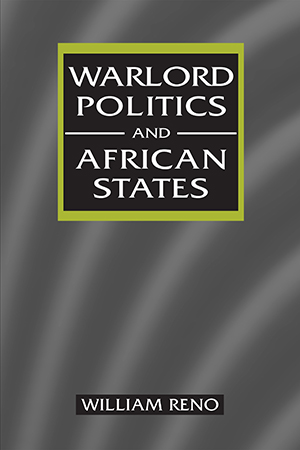The dramatic reconfigurations of political authority taking place in Africa—what many term "warlordism" or "state failure"—call for an exploration of the origins of these changes, the likelihood of their durability, and their implications for the continent's regional system of states.
Reno argues that the end of the Cold War as a particular configuration of the international state system changed by definition the nature of sovereignty in Africa. Rulers cut off from overseas largess are now vulnerable to threats from strongmen; enterprising strongmen join with marginalized groups to exploit regime weakness; opposing groups traffic in illegal drugs, weapons, and natural resources and even forge foreign commercial partnerships.
Focusing on the examples of Congo, Liberia, Nigeria, and Sierra Leone, Reno demonstrates how rulers hold on to power amidst cutoffs of foreign aid, collapsing economies, and disappearing bureaucracies. In his tightly argued book, he analyzes the emergence of a diversity of forms of political authority and the effect of their appearance on relations between states in the region; he also considers how the international system accommodates a growing variety of constitutive entities.
The evidence presented contradicts the conventional wisdom that Africa's worst-off states are those increasingly marginal to the world economy. Ironically, closer integration of these states into global markets promotes warlord politics, not the bureaucratic forms of administration that most studies of reform in Africa prescribe.
William Reno is professor of political science at Northwestern University. He is author of Corruption and State Politics in Sierra Leone.
"The immense strength of this book is to provide an analysis of what has actually happened in a number of African countries where the state has ceased to function.... Not only does the author paint a convincing picture of the seemingly incomprehensible chaos into which some of these countries have fallen but he develops a clear model of how ‘rational' politics can function even in such conditions.... This book should be read by all ... who have a genuine interest in African politics."—Patrick Chabal, International Affairs
"This is a chilling book, carefully researched and devastating in its implications."—I. William Zartman, Political Science Quarterly
"This is an important as well as a fascinating book.... In addition to providing rivetting accounts of the skullduggery that passes for politics in at least parts of the continent, it places these within a frame of reference which encourages much wider reflection on the African condition."—Christopher Clapham, Journal of Modern African Studies
"Reno has written what may be the most challenging book on political decision making in decades."—Choice
"This innovative study investigates warlord politics in weak states with rich endowments: Liberia, Sierra Leone, and the former Zaire, with Nigeria as a potential candidate. . . . [Reno] makes a serious effort to challenge conventional wisdom about failed states and the virtues of free markets and small government."—Foreign Affairs
"Reno's claim that . . . the politics of patronage . . . are turning into sovereignty-begging warlordism—which the global forces of capital and war-making don't mind too much at all—is well supported in his case studies. . . . his adept insertion of a global logic with the local one is most edifying."—African Studies Review








